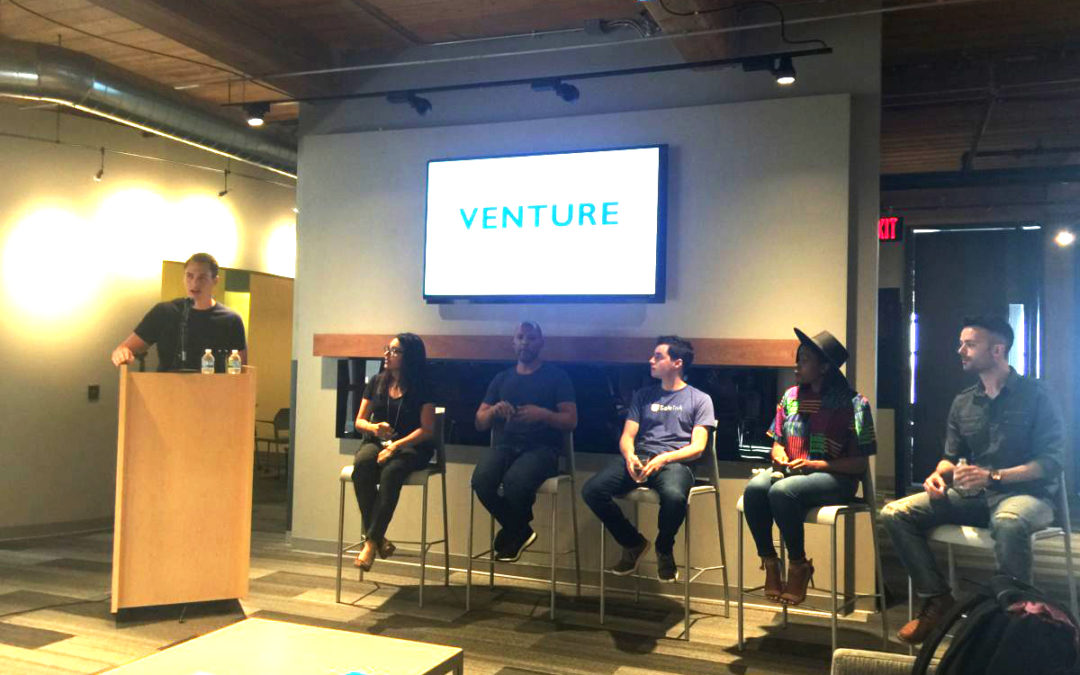Partner Content: What is this?
Estimated reading time: 8 minute(s)
On Monday, May 15, the eve of Capital Innovators Demo Day, the St. Louis-based accelerator hosted a panel discussion at T-REX with Cultivation Capital, Venture for America, and PluggedIN titled, “How to Strengthen and Grow Your Startup Ecosystem.”
The panel featured Leslie Miley, President of Venture for America’s (VFA) Executive in Residence (EIR) program, who previously served in engineering leadership roles at Slack, Twitter, Google and Apple. His goal at VFA is to fuel growth in startup communities outside Silicon Valley. Miley gave the keynote at Capital Innovators Demo Day the following day.
Trevor Tune, Program Director for Capital Innovators, provided some context for the relevance of Miley’s expertise to St. Louis in his introduction. “The VFA Executive in Residence program pairs Silicon Valley executives with startup cities and startups in those cities, like St. Louis,” Tune said. “As many of you who live in St. Louis know, St. Louis as a city is really only seeing economic growth from companies that start here, stay here, and grow. So while Leslie is in town, we want to have a panel discussion to brainstorm on this topic–how St. Louis can continue to grow its ecosystem.”
In addition to Miley, the panel included Zach Winkler (Founder and CEO of SafeTrek), Keisha Mabry (Director of Innovation at College Bound), Anthony Richardson (General Partner at Agility Collective) and Yvette Rodriguez-Acosta (VFA fellow and Associate at Cultivation Capital). Each one of the panelists possessed a unique combination of both local and national experience with startup development.
Colleen Jenkins, founder and CEO of PluggedIn, facilitated the panel. Setting the tone for the conversation, she said, “What we hope to achieve today with this discussion is a feedback loop for the St. Louis ecosystem. We have various perspectives on the panel that can help with that.”
Here are some of the takeaways from the thought-provoking discussion.
St. Louis has some unique strengths—including philanthropy.
The panel identified Life Sciences, AgTech and Financial Services as clear strengths in the St. Louis startup ecosystem. Anthony Richardson, General Partner of Agility Collective as well as author of the 2014 book Full-Scale: How to Grow Any Startup Without a Plan or a Clue, said, “If you look at funding reports, 58% of our funding comes from the life sciences and biotech areas. Companies like Monsanto and others are starting to lead the way with a lot of corporate innovation and putting into place funding mechanisms that are going to bring together the prominence of the region in AgTech.”
Keisha Mabry, Director of Innovation at College Bound St. Louis and social entrepreneur, pointed out St. Louis’ philanthropic reputation and how that strength represents not only social interests but a profitable business model. She said, “I think if anyone gets the importance of giving back and paying it forward, it’s St. Louis. Some people would even call St. Louis America’s most charitable city. Non-profits and social enterprises can not only make money but they can also give back to a certain group and people are willing to pay a premium for that. We can help people not only think about business cases for their organizations but also the mission cases for it as well.
St. Louis has the necessary ingredients—and its location is an advantage.
Leslie Miley believes [a startup’s success] comes down to the people involved in the effort and how they work together as a team–and that there’s no reason that highly functioning teams won’t work best outside of Silicon Valley.
He said, “I’ve always said I’ll take a B product and an A team over an A product and a B team. Every successful pivot I’ve seen has been because the team is awesome. And it’s been a diverse team and it’s been a talented team, it’s been a team that can take criticism, because that’s something that a lot of people can’t do. They think, ‘Oh you just forge ahead.’ No, teams have to learn. and they have to really play off each other.”
Miley continued, pointing out that being outside the Valley can be an advantage: “People in Silicon Valley are now averse to risk, and they’re starting to look outside of Silicon Valley to find the people who are willing to take the risk–the risk of a startup company, the risk of a new idea. The great thing about Silicon Valley is there is an abundance of capital, there is an abundance of people, there is an abundance of data. But sometimes abundance makes you more risk-averse. You have to go to some place that doesn’t have all of that. You have to flex muscles you haven’t used before. You have to start thinking and extending yourself in ways that you haven’t. And that’s how I think you want to look at a market–maybe you have this great concept, great idea, and you’re not executing. And maybe you’re not executing because maybe you’re not around the right people.”
Accelerators play an important role–and are seen as both a blessing and a curse.
Startup accelerators, numerous in St. Louis, are intended to help startups get their feet on the ground. Yvette Rodriguez-Acosta, Venture for America Fellow and Associate at Cultivation Capital, believes they are helpful, but warns that startups should be careful about completing program after program without attaining their goals. She said, “Beyond the accelerator stage, startups still need resources, mentoring, and capital. Sometimes we see startups through three or four accelerators. That sends up a red flag in my head. If you’ve gone through so many and haven’t accomplished what you set out to do, why is that?”
Miley said, “I think [accelerators] do good, but they can also be used as a crutch. Having to do this stuff on your own, for so long,…

